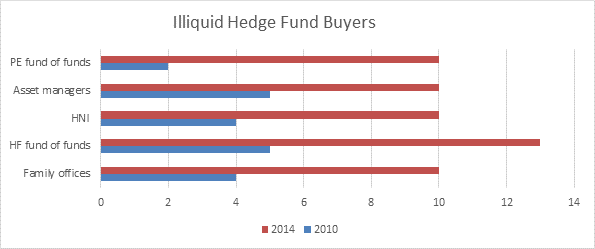Tips to Attract Hedge Fund Investors
Post on: 26 Май, 2015 No Comment

By Wendy Roberts,
Tuesday, April 27th, 2010
Eze Castle recently hosted a live web event focused on Marketing and Communications — two topics which, up until recently, many managers simply did not associate with hedge fund operations. These days, however, the topic comes up pretty frequently as managers are realizing that hedge fund investors are demanding more of them. And it doesnt end there! The competition for all the capital out there is becoming increasingly intense. The question is, how do you make a hedge fund manager more comfortable in the Sales and Marketing role? Then, once youve landed the capital, how do you communicate effectively with the hedge fund investors? A whole new slew of issues arises here — how, and how often, can a fund communicate with hedge fund investors? How does one do this while staying in compliance with regulations?
The Communications Paradigm
Kevin Kasper, Principal at BK Communications Group, kicked off the event with an overview of what he has termed the Communications Paradigm for Hedge Funds.
Kevin explained that in the new asset allocation landscape, there is increased competition for assets, and every fund manager is guilty until proven innocent. Although this seems like a daunting environment, it is important for the manager to realize that every touch point with a prospect or client is an opportunity to build credibility, trust, and rapport.
The fund management team must first develop a core message and brand the fund. The brand must be set on a strong foundation — which should include an internal audit of marketing communications to create a consistent look and feel. Many funds turn to external resources for help in this process. This fresh perspective is usually a great idea for a fund that may not have experience in brand management.
Once a brand identity is created, build it out in materials — which can or should include the website, pitch book, brochure, newsletter, whitepaper, blast emails, and press releases. The manager is then better prepared in his/her personal presentation and heads into that prospect or client service meeting with a defined message and plan to deliver that message.
The Website
You probably picked up that I wrote website first in that list of materials — which was intentional. Times, they are a changin. Thats why we asked Evan Rapoport, co-founder and managing partner of HedgeCo Networks, to join the panel. Among their other services, HedgeCo has designed over 400 websites for hedge funds, RIAs, and mutual funds. Evan explained that although hedge funds were a little late to the game when compared with other types of investment management firms, they can no longer afford to put up a website with a logo on it and nothing else. Or worse, to have no website at all!
Common practice was to entirely avoid hosting a website, in order to protect the fund from regulations prohibiting hedge fund advertising, marketing, and sharing of investment philosophy and performance. Yes, it may seem better to have no website rather than one which may put the fund at risk, but the benefits of setting up a well-run website far outweigh those of no website.
For one, a well-designed website can allow for a positive first impression with potential investors. It allows for open communication with investors, regardless of time zones and potential conflicts. Existing investors can instantly access fund performance information, up-to-date contact information, capital statements online. And finally, it will become the central distribution point for marketing material and investor letters.
Through the site, a fund manager can track investor qualifications ensuring only accredited investors can access the materials. A good website will also instantly index all requests for materials, including legal documents. This is key because these days, transparency is the name of the game. But like any game, there are rules. So how do you set up a website to be informative, transparent, and secure?
A secure hedge fund website will require a member login, which validates the prospects name, company, position, and contact information.

A brief survey should inquire of their interests — who the registration is for, what their current involvement with a hedge fund is, how large their portfolios are, what their investment size is, and what kind of fund they are looking to invest in. Make sure you provide a section asking the prospect to certify what kind of investor they are. These questions, among others, will help ensure your funds safety. Behind the website, set up processes to double- and triple-check the prospects answers. Once you confirm who they are, you can send a link confirming their access to the website, where they can learn more specifics about the fund.
Be sure to set up the site with varying levels of access, dependent on the login. Prospects can see one layer, investors can access more, and ultimately, your funds employees have full or near-full access to the sites content, including information on the management team, marketing materials, fund structure, performance, letters and articles, and legal documents. To be certain that your new website is in compliance, working with a reputable firm like HedgeCo Networks is always a good idea.
The Data
So now that we know how and to whom a fund can communicate, what should the fund communicate? Most funds work off of internal, typically homemade systems to organize their funds data. Prospects, investors, performance. each bucket can contain thousands of pieces of data. It is important from both the communication and compliance perspectives that you ensure these thousands of pieces of data are well-organized, secure, indexed, and reportable.
Bob Guilbert. Managing Director with Eze Castle Integration, was the final webinar panel, reviewing how a CRM (Content Relationship Management) tool can aid in managing a funds data for the website and reporting. The advantages to a CRM are numerous, by many funds still ask why they need a CRM. A hedge fund CRM can be especially useful to a hedge fund, which typically runs leaner than other financial firms. With less staff, it can be more taxing on a small fund to run reports, manage a website, distribute information, and organize customer information. On top of all the other functions that each person is responsible for, who has the time?
Setting up a CRM will allow for effective, professional communication with clients and prospects. A fund manager can more easily track multiple opportunities across investors through the centralized access to the information. A CRM will also organize client and prospect information more effectively, and will create efficiencies in reporting. Integrating the CRM to your funds website, email, and hard copy reports will free up time and alleviate concern over which data is where, going to whom, when, and how!
This webinar was the second weve hosted on the topic of hedge fund marketing (you can watch the webcast from the first here ), and we hope to continue to share more valuable information on this topic in the future. The hedge fund industry has evolved and is highly unlikely to revert back to the tight-lipped, secretive funds of years past. Dont jump into a Marketing & Communications Plan without first accessing the entire series of materials weve organized for you here. And as always, we are here for you to discuss your marketing plans. Reach out to us for ideas!














